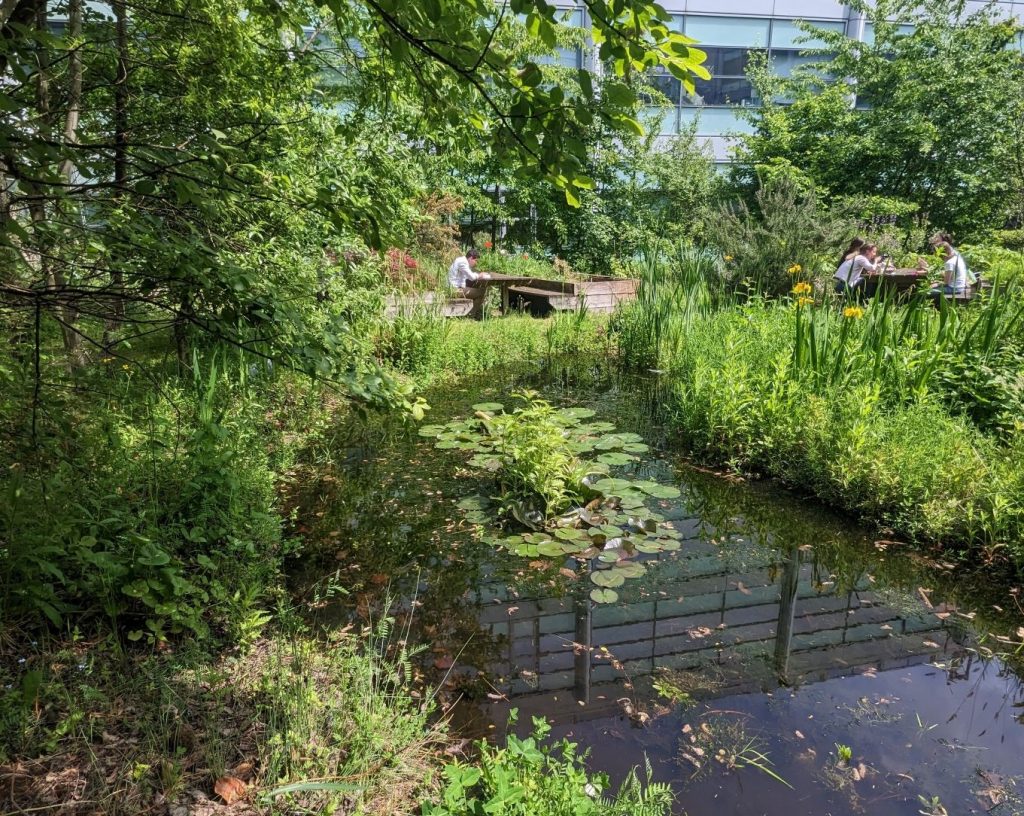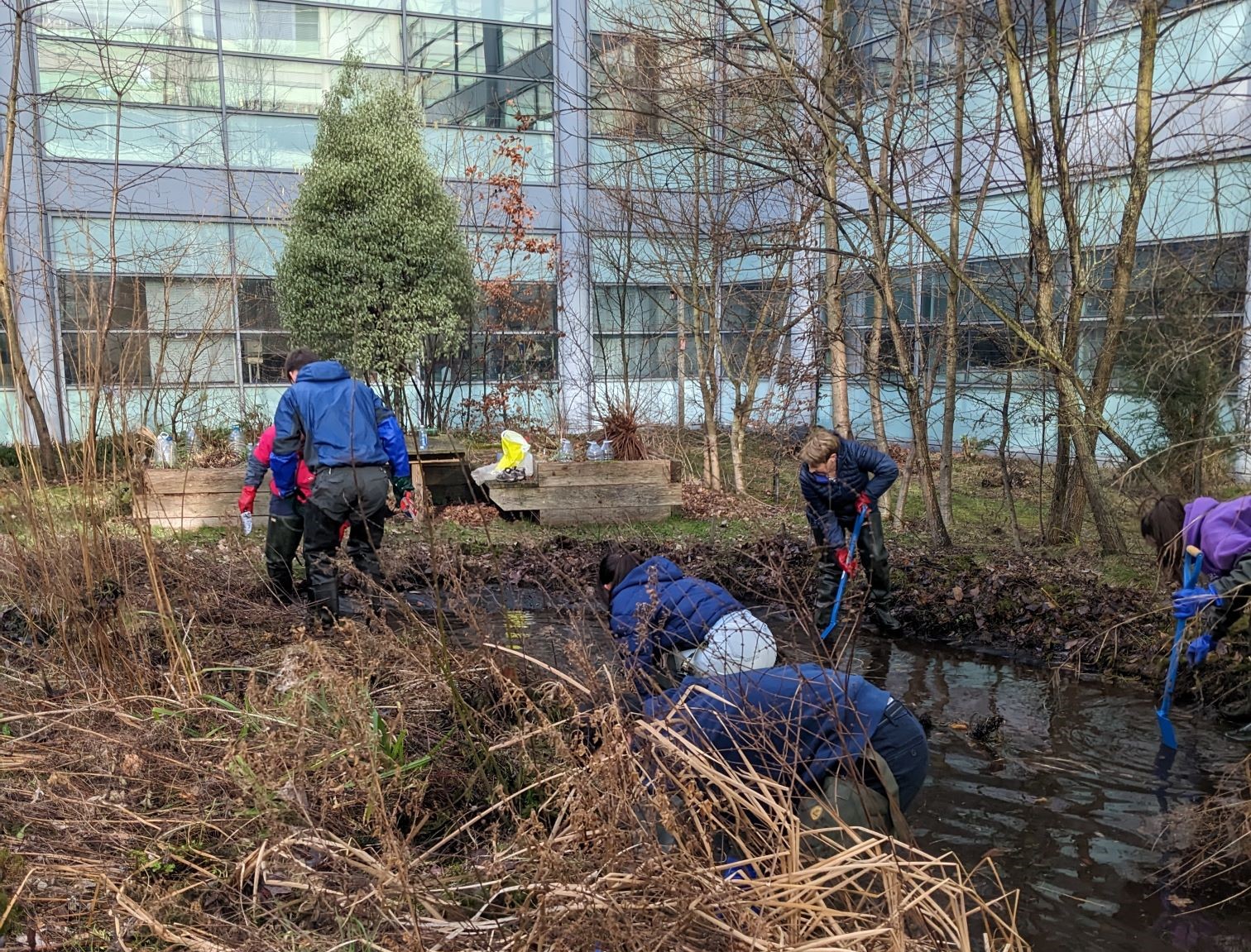
Supporting urban biodiversity: The Michael Smith Quad
Urban biodiversity is positively associated with human health and wellbeing; as global biodiversity declines at an unprecedented rate, its loss will threaten the quality of life of all humans. It is therefore extremely valuable for biodiverse green spaces to be incorporated into urban areas, including on our own University campus.
This is the mission of the quad wildlife garden in the Michael Smith Building, which is open to staff and students who work in the building and hosts events to highlight environmental sustainability on campus.
Here is some of its history.
Originally an uninspiring lawn, the quad in the Michael Smith Building had limited capacity for any wildlife to thrive. However, over a decade ago, the site was transformed. Using an Environmental Sustainability budget to increase the green spaces on campus, Outer Space Landscapes, a Manchester based landscaping company, converted the site into the important wildlife garden we see today.
The site was planted with raised beds, wildflower borders, hay meadows and large trees, supporting nesting birds such as blue tits and plants such as military orchids and bluebells. An array of British fruit trees were planted, producing apples and medlars which members of staff have made into jams and other preserves. Rare species have been found in the quad, such as a Lady’s Slipper Orchid which continues to grow every year. In the summer of 2016, a student carried out soil analysis in the quad, revealing that the amount of carbon stored in the quad’s soil is equivalent to 60 return flights from Paris to Manchester.

The quad-garden pond in February 2023. Volunteers are removing excess plant matter and dead leaves. By clearing the pond, breeding habitat is improved for common frogs, which usually spawn in early spring.
Additionally, a pond was dug in the quad, which is now rich in animal life, such as pond-skaters, dragonflies and common frogs. To ensure the maintenance of its aquatic inhabitants over winter, the pond was deepened in 2011 to ensure it wouldn’t completely freeze. A recent survey in the pond found it to contain swathes of beneficial aquatic plants and limited encroachment of harmful duckweed and filamentous algae.
Besides providing a space for relaxation or for coffee and lunch breaks, the sustainability team aimed to actively engage staff and students with the biodiversity in the quad.
On 25th April 2017, the quad was officially re-launched. This event highlighted environmental sustainability events on campus and encouraged people to engage with the living campus plan. Activities included plant sales, gardening classes, a competition, and a seed swap. In addition, staff signed up to become sustainability and campus champions, who have roles such as: helping to maintain the garden; encouraging increased biodiversity; and encouraging the use of the quad as a teaching and wellbeing resource.
In May 2018, to promote sustainability, students and staff were invited to perform a bio-blitz to understand more about the biodiversity in the quad. Staff also created wildflower seed-bombs to spread pollinator friendly flowers around campus.
The quad also contributes to teaching and research: Biological and Environmental science students have utilised the garden for bio-blitzes, providing both training in field skills and an assessment of the quad’s wildlife community over time.
Due to the COVID-19 pandemic, engagement with the quad fell, with work needing to be done to renovate the pond, reinvigorate the surrounding planters and to improve the general appearance of the space. Despite this, the quad remains important for biodiversity and wellbeing on campus.
In December 2024, the Quad team hosted an eco-crafts event for FBMH staff. A chance to get creative ahead of the festive season, the eco-crafts session is the first of many engagement opportunities planned for the Quad space over the coming months.
Quad team
Brenden (Bred) Beckett (Quad Manager) – 1st year PhD Student in the Soil & Ecosystem Ecology Lab, Department of Earth and Environmental Sciences
Taking over from former Quad Managers, Issy and Lily, Bred brings with him expertise in biodiversity, forestry and soil health. Currently doing his PhD on plant-herbivore interactions, Brenden pursued his Master of Research on forests and biodiversity. This led him to Sweden and France, where he investigated the impact of forestry on spider populations, developing an interest in how we can enhance the species diversity of forests and woodland areas. He pursued this interest further at Forest Research where he worked on invasive pest management.
Brenden previously worked as head of communications at UK Youth 4 Nature, a youth-led organization mobilising and empowering young people across the UK to advocate for nature conservation and climate action. During his time, he led several impactful projects, including a campaign that collaborated with local artists and communities to create striking murals in cities across the country, successfully capturing the attention of political leaders on important environmental issues.
Brenden plans to devise a long-term plan for the quad that will enhance ecological health and secure a sustainable future for the space. He also aims to create a community feel as well as engage more students through educational sessions, such as techniques for invertebrate identification, which would not only teach students key biodiversity monitoring techniques but would also help monitor species present in the quad. He’s keen to unite many aspects of the Quad’s success into wider campus behaviour and grow wider engagement in our green spaces.
To find out more about ES in FBMH: visit the faculties webpage on Environmental Sustainability, explore our StaffNet page on Sustainability, read the latest news on Sustainability in the School of Health Sciences, or contact srbmh@manchester.ac.uk to sign up to our ES good newsletter.
To find out more about ES at the University: watch our short film, visit the Environmental Sustainability webpage, sign up to the Social Responsibility newsletter, get involved in Environmental Sustainability initiatives across campus, or contact es@manchester.ac.uk

0 Comments